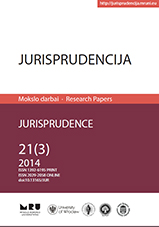THE RIGHT TO RESIST AND THE RIGHT OF REBELLION
THE RIGHT TO RESIST AND THE RIGHT OF REBELLION
Author(s): Yulia RazmetaevaSubject(s): Law, Constitution, Jurisprudence
Published by: Mykolas Romeris University
Keywords: the right to resist; the right of rebellion; public authorities; international law; human rights
Summary/Abstract: The right to resist and the right to rebel have again become relevant as legal problems. Their justifications traditionally derive from natural law, human rights, the principle of the lesser evil or of the social contract. Interpretation of the right to resist expresses the tendencies to the law of people, in particular, the right to self-determination, distinguishing national and international understanding, and underscores the special nature of such right. Also, two-level research of the right to resist should be distinguished research of the right to resist – the first is a debate about the nature character and legislative consolidation of this right, partly focused on preventive-limiting its properties, whereas the second one is updated at the time of social upheaval and legal concerns, and it contains not only the evaluation of the events, but sometimes attempts to justify ex post risk of abuse and original post-legitimation of public authorities. An important condition for the existence of the right to resistance is a legitimate aim. This could be called the internal condition, which is provided by those who implement this right. Other condition (which can be called external) and the base of implementation should recognize certain actions, acts or decisions by public authorities – those that violate human rights are illegal and unfair. At the same time, the purpose and result of the right to resistance may be changes in the public authorities, the termination of abuse of authority and violation of human rights by its agents, return to democratic legal regime or change in the constitutional system, aimed at creating a state of law, as well as in some cases, when combined with the right to self-determination, – the achievement of independence. The author of the present paper considers that the right to resist is an individual right, a human right. But the author inclines to the idea of the collective nature of the right to resist implementation, but warns against simply counting the number of persons engaged in it. In other words, it does not matter how many people commit acts, but it does matter how many people support them. Considering the modalities of implementing the right to resist, it should be noted that these forms can be active or passive, expressed in actions directly or indirectly. The right of rebellion is an extreme form of the right to resist, which is carried out in case if the non-violent means of resistance are exhausted or proved ineffective. The conditions (and bases) of the right of rebellion are phenomena, such as the following: (1) massive human rights violations by public authorities (quantitative criterion); (2) systematic human rights violations by public authorities (accumulating criterion); or (3) extraordinary human rights violations by public authorities (criterion by serious, explicit and violent nature of the violation). Ambiguous is an issue of the limits of the right of rebellion, its permission and proportio
Journal: Jurisprudencija
- Issue Year: 21/2014
- Issue No: 3
- Page Range: 758-783
- Page Count: 26
- Language: English

